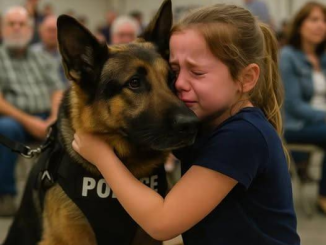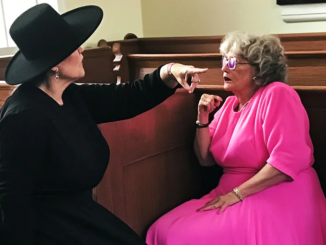
When he was ten, he stood on stage at school, grinning through missing teeth, and read his “My Hero” essay in front of the whole auditorium.
It was about me.
He said I was strong. That I always made his lunch just the way he liked it, even when I was tired from work. That I could fix anything, even when things felt broken. I still have the paper in a folder under my bed—creased in the corners, smudged with what I think was grape jelly.
That was fifteen years ago.
Now? I can’t even get him to pick up the phone.
It started after the divorce. Or maybe before that. Maybe I missed it, too caught up in just surviving. But over time, our calls got shorter. His visits stopped completely. Then, one day, I texted just to say hi—and he didn’t answer.
I waited a day. Then another. Then I sent one of those little waving emojis. Nothing.
At first, I thought maybe something had happened. Maybe he lost his phone or was going through something and didn’t know how to say it. I left a voicemail. Then another. Each one a little shorter than the last, my voice quieter, trying not to sound like I was pleading.
Weeks passed.
Then I saw it: a photo on his girlfriend’s page. Him, smiling, holding a drink, surrounded by friends. Alive. Laughing.
And not once had he picked up.
I finally mailed him a letter—yes, old-fashioned, handwritten. Told him I missed him. That I didn’t need a long conversation. Just a sign he still thought of me.
Two days ago, I got an envelope in return. No return address. No card inside.
Just a single sticky note.
His handwriting. Four words.
“You’re not the same.”
The note hit me like a punch to the gut. I stared at it for hours, turning it over in my hands, as if the back might hold some hidden explanation. It didn’t. The words were plain, unapologetic, and final.
What did he mean? Not the same as what? As who I used to be? As the dad he wrote about all those years ago?
I spent the next few days replaying every memory I had of us—the good ones, the bad ones, the ones I’d tried so hard to forget. Was he talking about how much time I worked during his childhood? About how I snapped at him when I came home exhausted? Or was this about something else entirely? Something I hadn’t seen coming?
One night, unable to sleep, I decided to do something drastic. I drove to his apartment building. I didn’t plan to knock; I just wanted to see where he lived now. To feel closer to him somehow. The place was nicer than I expected—a brick building with flower boxes hanging outside each window. There was even a small park across the street. He’d done well for himself, better than I ever imagined.
As I stood there, staring up at the third-floor windows, wondering which one was his, a woman walked out of the building. She held the door open for me without thinking twice. My heart raced. Should I go in? What would I say if I ran into him? Before I could talk myself out of it, I stepped inside.
The lobby smelled like fresh paint and coffee. A bulletin board near the elevators displayed flyers for yoga classes and neighborhood potlucks. Everything seemed warm and inviting—nothing like the cramped apartments I’d grown up in. His name wasn’t listed on any of the mailboxes, but I remembered seeing his girlfriend post pictures of their cat online. If I recognized her, maybe I could figure out which unit was theirs.
I took the stairs slowly, listening for sounds behind each door. On the third floor, I heard laughter coming from down the hall. It sounded like him. My chest tightened. I froze, unsure whether to move closer or turn around and leave.
Before I could decide, the door opened. And there he was.
He looked older, taller, but unmistakably my son. For a moment, we both just stared at each other. Then his face hardened.
“What are you doing here?” he asked, his tone sharp.
“I… I came to check on you,” I stammered. “I haven’t heard from you in weeks.”
“Well, I’m fine,” he said flatly. “You don’t have to worry.”
“I wasn’t worried about that,” I said quickly. “I just miss you.”
He crossed his arms. “If you missed me, why didn’t you call?”
“I did!” I blurted. “I called and texted. I even sent you a letter.”
“And I sent you a reply,” he shot back, nodding toward the sticky note still tucked in my pocket.
“That’s not an answer,” I said softly. “It’s four words. You owe me more than that.”
For a second, I thought he might slam the door in my face. Instead, he sighed and leaned against the frame.
“Come in,” he muttered reluctantly.
His apartment was cozy but sparse—minimal furniture, lots of books stacked neatly on shelves. His girlfriend wasn’t home, which made me grateful. This was already awkward enough without an audience.
We sat on opposite ends of the couch. He fiddled with a coaster while I wrung my hands together.
“Why did you write that?” I asked after a long silence.
He glanced at me, then looked away. “Because it’s true. You’re not the same person you used to be.”
“I know people change,” I said carefully. “But you make it sound like I changed for the worse.”
“Maybe you did,” he said bluntly. “Did you ever stop to think about how your choices affected me? Like moving out after the divorce? Leaving me alone with Mom while she fell apart? Or how about working late every night instead of being there when I needed you?”
Each accusation landed like a blow. I opened my mouth to defend myself, but nothing came out. Because deep down, I knew he was right.
“I thought I was doing the best I could,” I admitted quietly. “I thought providing for you was enough.”
“It wasn’t,” he said simply. “I needed you to show up—not just pay the bills.”
I nodded, tears pricking my eyes. “I messed up. I see that now. But I’m sorry. Truly sorry. Can we start over?”
He studied me for a moment, his expression unreadable. Finally, he shrugged. “I don’t know. Maybe.”
Over the next few months, we started rebuilding our relationship bit by bit. He agreed to meet me for coffee once a week. Our conversations were awkward at first, filled with long pauses and forced small talk. But gradually, they became easier. We talked about his job, his hobbies, his dreams for the future. Slowly, I began to earn back his trust.
One day, he surprised me by showing up at my house unannounced. When I opened the door, he handed me a box wrapped in brown paper.
“What’s this?” I asked, confused.
“Open it,” he said with a faint smile.
Inside the box was the original “My Hero” essay he’d written all those years ago. Only this time, it was framed, along with a new note taped to the glass.
It read: “You may not have been perfect, but neither am I. Let’s keep trying—together.”
Tears streamed down my face as I hugged him tightly. In that moment, I realized forgiveness isn’t about erasing mistakes. It’s about acknowledging them, learning from them, and choosing to move forward anyway.
Life Lesson: Relationships take effort, patience, and humility. Even when things seem irreparable, taking responsibility for your actions and genuinely wanting to improve can open doors you thought were closed forever. Sometimes, saying sorry is only the beginning—it’s what comes after that truly matters.
If this story resonated with you, please share it with someone who might need to hear its message today. And don’t forget to like the post to spread positivity!






Leave a Reply